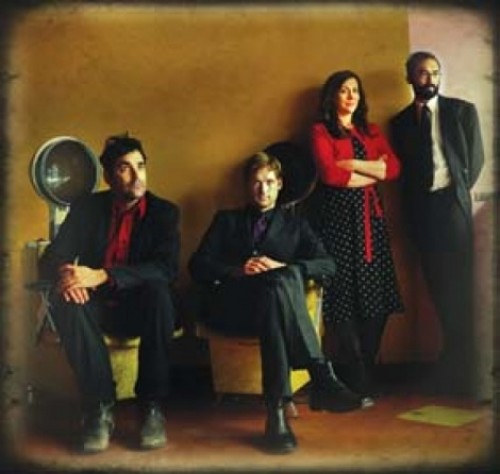Up close and personal, Devotchka’s four members strike a commanding pose. Dressed in clothes that appear dusted and somehow road-weary, they sway and saunter, pluck, blow, bang, strum and blow out melodies reminiscent of faraway lands and times past. Their leader, Nick Urata, is perhaps the most striking of the bunch. Wearing a wrinkled tuxedo sans tie and missing buttons, he looks like he just came from a disastrous wedding with an open bar. Back by multi-instrumentalists Jeanie Schroder, Tom Hagerman and Shawn King, he furiously strums his guitar, angles notes on a Theremin and croons into a vintage mic. His passion is infectious, to say the least.
nAt a recent show, a man in an ape costume jumped up and down. Another audience member lifted his hand and clutched the air in time with Urata’s falsetto. Others danced arm in arm. Tom Hagerman, on violin, stepped offstage and swayed with the crowd as he led the band through a tumbling, tango melody. The man in the ape costume hopped onstage and took off his mask to play a trumpet. The spectacle was typical of the Devotchka experience—lines blurring between audience and performers. Enveloped in the gypsy spirit, the audience plays the part as though their DNA demands it.
nUrata chalks up his connection with the audience to a natural communion of music and celebration.
n“It is a privilege to share music with strangers and patrons,” he says. “Despite what we’ve all been led to believe, you are not just somebody’s child—or a barista, student, boyfriend, drunk, artist, waitress or sister. You are all a part of something too huge and old to fathom, and that is a lot more interesting point of view.”
nUrata’s gravitation toward antiquated music is not accidental. Urata, the grandchild of an arranged marriage between a Sicilian and a Gypsy, deliberately evokes the spirit of his lineage within his music. ”There is a vast history and tradition to be approached with great reverence,” he says, “and we let ourselves get swept away in it all.”
nDevotchka’s gypsy-dance party manages to fly, for the most part, beneath the mainstream radar. Devotchka’s music has been featured in film—including the 2006 Sundance hit Little Miss Sunshine— television, and on video games, but they are still able to play smaller, more intimate venues. “We are kind of lucky to be flying below the radar,” Urata says. “I would like us to be a secret or a private joke,” he says.
nMany contemporary artists are in on the joke, taking cues from Devotchka and following their lead, sometimes to levels of success exceeding that of Devotchka’s current fame. While enjoying a cult following at present, their music will likely hold status for years to come much the way genre benders and innovators Captain Beefheart and Frank Zappa continue to be influential years after their contributions.
nAnd, like Zappa and Beefheart, Devotchka are not concerned with the conventional definition of “making it.”
n“Who cares if the mainstream ignores you?” Urata says, noting he is in it for the music and the experience. He doesn’t write songs designed for mainstream success. He writes songs to set the songs free. During the writing process, each band member contributes equally. But, much like their live performances, Urata contends that there are forces beyond their control in the writing process. “We just let the song dictate the decisions,” he says.
nUrata does have one mission, though: to get people to feel something authentic and dance their asses off. “If I die today,” Urata exclaims, “I will know I did what I was supposed to do and connected with people on a level that no journalist can ever comprehend.”
nMaybe so. But I can dance my ass off, too.
n
Devotchka
nIn the Venue, 579 W. 200 South, Wednesday, Jan. 28, 7 p.m. 24Tix.com
Speaking of Articles, Devotchka
-
Lounge Act Tues.: Heartless Bastards, DeVotchKa, Women's Voices
- Mar 1, 2011
-
DeVotchKa
Denver's DeVotchKa bring the circus to town (again), Tuesday at In the Venue.
- Feb 28, 2011
-
Voodoo Gypsy Blues comin' to SLC, Ogden
- Dec 29, 2010
- More »
More by Jeremy Asay
-
Joe Goode Performance Group
'The Rambler': Felt performance
- Feb 20, 2012
-
Corporate Rock
SLC barbershop redecorates after lawsuit
- Nov 9, 2011
-
Ty Segall
Prolific SF songsmith 'rawks' it
- Oct 4, 2011
- More »
Latest in Music
Readers also liked…
-
The Alpines Head North
Local band's debut concept album finds musical bliss in the apocalypse.
- Feb 7, 2024



